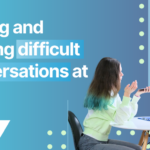Thinking about animal communication can help us communicate with people in life and work, too… by thinking about body language, not just words.
Communication is a Young Professional skill that’s a powerful mix of how you present yourself, how you influence other people, and how you share information and ideas with them. It will get you far in life… but it’s like a muscle you have to train!
Animals are a really interesting way to think about communication because they don’t use words with each other, and our pets can’t talk to us either! At least, not using words. Animals can teach us lots of ways to communicate without words, and also to spot how other people might be feeling even if they don’t want to tell us out loud.
Animals are easy to love because they look up to us and trust us. That’s not necessarily the case with the people we meet at school, work or social occasions! Sometimes things like shyness and anxiety get in the way of people bonding. Sometimes, you have to put some effort in if you want to earn someone’s trust. So how can animals help us to become better when we communicate with people?
Young Professional Challenge: how does an animal ‘talk’?
Step 1: Watch an animal at play.
Find an animal and look at it for a little while. Perhaps you or a friend have a pet to play with, or you could go to the park and watch the dogs and squirrels there.
Step 2: Ask yourself…
- What is the animal feeling? Curious? Tired? Afraid? Energetic? Playful? Bored? How do you know? What signs are they giving about their feelings?
- How do they behave if they’re not sure about something, like approaching an unfamiliar dog or human?
- How do they behave when they’re happy or confident?
While you watch the animal, think about how the behaviour you’re seeing could help you work on how you communicate without words at school, work or in social situations.
Things to think about:
- Does a smile put people at ease the same way a dog wags its tail?
- Does a friendly approach and making the first (positive) move get better communication results than hanging back or running away?
- What helps an animal behave at its best around people? Treats and rewards or fear of punishment? Why?
How does this challenge help you in life and work?
It’s important to to recognise the needs of others in the workplace, especially if they are silent about anything they’re unsure of. Spotting the body language and behaviour of people feeling things like uncertainty, confusion, fear or distress is an important part of building your communication skills. It can help with your empathy, making you a better team mate when the pressure is on at school or work. The same way a person cares for their pet, your empathy can make you be the one who steps up to help an anxious person out when they’re feeling too shy to say anything. It can also help you realise when a grumpy friend or workmate isn’t really grumpy with you, just about something else in life, and what they really need is your help.
In the same way, thinking about your own body language and behaviour can also help you decide what to do if YOU are the one who wants some kindness and help, like an animal would. Maybe you’ve got a problem or question you are not sure how to share with your teacher, boss, parent or friend. Are you giving them the silent treatment, hoping they’ll magically know what’s bothering you? If so, how will they know what is wrong? Are you approaching them with your teeth bared or with a wagging tail? Which attitude might help you achieve what you want?
Thinking about body language can help with your leadership skills, too! People will look up to you, waiting for you to give them cues on what to do and how to do it, so they may not always feel confident enough to say what’s on their minds. You have to spot the signs there’s something wrong so you can make a decision on best next steps to take.













